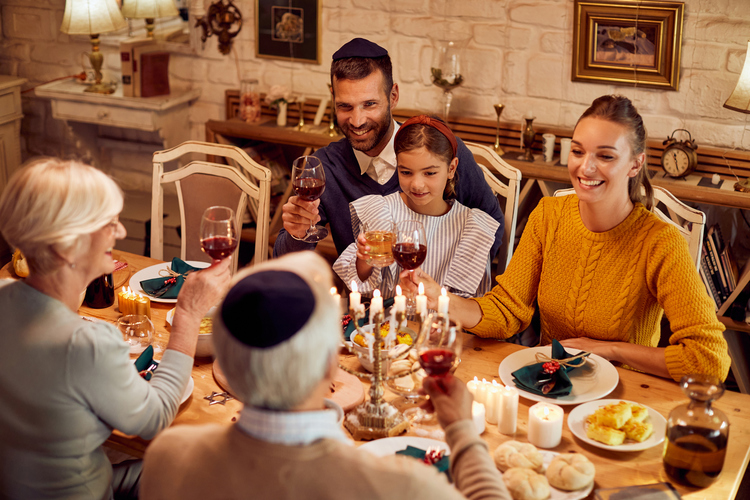
Do You Get a Black Moon?
What is a Black Moon, and why does it happen in December?
Known as the Festival of Lights, Hanukkah (or Chanukah) is an eight-night holiday that recalls an ancient miracle and celebrates religious freedom.

Families gather on Hanukkah to light candles, play games, and sing traditional songs.
© iStockphoto.com/Drazen Zigic
While this is not a public holiday in the United States, some Jewish-run organizations might be closed during the festival.
Hanukkah (or Chanukah) starts on the 25th day of the month of Kislev in the Hebrew calendar, which usually falls in late November or early December in the Gregorian calendar.
The holiday lasts for eight nights, ending on the 2nd of the Jewish month of Tevet.
At sundown on the first night of Hanukkah, Jewish households in the United States often say blessings in Hebrew before lighting the traditional menorah (or hanukiah).
This special candelabra’s nine arms hold one light for each night of the eight-day holiday, plus a single candle called the shamash (helper) used to light the others. Each night, a new candle is added to the menorah until all eight are lit.
At Hanukkah celebrations, families gather to share meals, sing songs, and play games with a spinning top called a dreidel. Packets of money, or gelt, are often handed out to children and, in some homes, Hanukkah is a time for gift-giving.
Since oil is a big part of the Hanukkah story, special foods prepared in oil are on the holiday table of many Jewish families. Classic dishes like crisp potato pancakes (latkes), sweet sufganiyot (doughnuts), crunchy mandelbrot (almond bread), and flavorful rugelach (filled pastry) are favorites across the country.
While most Jewish households in the United States trace their lineage back to an Ashkenazy (European) source, some Jewish Americans are descended from Sephardic (Iberian and North African) heritage.
Many Sephardic Jews have their own food traditions for Hanukkah, such as the merenda, a pot luck dinner held on the last night of the festival. Crisp, chewy cheese balls and donuts drizzled with honey called bimuelos are highlights of the merenda table.
The origin story of Hanukkah is based on events that took place in the Middle East more than 2000 years ago.
After a victory in their rebellion against the Greeks in the Maccabean War of 162 BCE, the Jewish people began a ritual cleansing and re-dedication of the Temple in Jerusalem, the faith’s holiest site.
To perform the rituals, holy oil was needed to light the Temple’s lamp, or menorah. According to the legend, when Jewish forces took control of the holy site, there was only a small jug of sanctified oil remaining - just enough to burn for a single day.
Since the rules for creating new fuel called for a strict eight-day purification period for the oil makers, the Jewish forces faced a dilemma. They needed to purify the temple, but didn’t have enough holy oil to keep the lamps lit for the entire period, as required by scripture.
The story of Hanukkah says that the remaining one-day supply of sacred fuel miraculously burned for eight days, allowing the rituals to be performed and the Temple purified.
For many people, this miracle of the lights has come to symbolize the perseverance of Judaism through the trials of history since the time of the Temple.
Today, Hanukkah celebrations often include words of appreciation for religious liberty and prayers of gratitude for the faith’s survival.
In the Jewish diaspora—Jewish communities outside of Israel—an extra day is usually added to religious observances, with the exception of Yom Kippur, which lasts only one day worldwide, and Rosh Hashana, which is celebrated over two days in both Israel and the diaspora.
This custom has its roots in ancient times when the beginning of the months in the Jewish calendar still relied on the sighting of the crescent Moon following a New Moon.
The beginning of a new month was determined by the Sanhedrin, the supreme court of ancient Israel in Jerusalem. Once the date was published, messengers were dispatched to spread the news among Jews living abroad. Since this process took some time, it was decreed that Jews outside of ancient Israel were to observe every holiday for two days to make sure the rules and customs applicable to each holiday were observed on the proper date. This rule is still observed today.
Note: Jewish holidays begin at sundown the day before the date specified for the holiday.
| Year | Weekday | Date | Name | Holiday Type |
|---|---|---|---|---|
| 2019 | Mon | Dec 23 | Chanukah/Hanukkah (first day) | Jewish holiday |
| 2020 | Fri | Dec 11 | Chanukah/Hanukkah (first day) | Jewish holiday |
| 2021 | Mon | Nov 29 | Chanukah/Hanukkah (first day) | Jewish holiday |
| 2022 | Mon | Dec 19 | Chanukah/Hanukkah (first day) | Jewish holiday |
| 2023 | Fri | Dec 8 | Chanukah/Hanukkah (first day) | Jewish holiday |
| 2024 | Thu | Dec 26 | Chanukah/Hanukkah (first day) | Jewish holiday |
| 2025 | Mon | Dec 15 | Chanukah/Hanukkah (first day) | Jewish holiday |
| 2026 | Sat | Dec 5 | Chanukah/Hanukkah (first day) | Jewish holiday |
| 2027 | Sat | Dec 25 | Chanukah/Hanukkah (first day) | Jewish holiday |
| 2028 | Wed | Dec 13 | Chanukah/Hanukkah (first day) | Jewish holiday |
| 2029 | Sun | Dec 2 | Chanukah/Hanukkah (first day) | Jewish holiday |
While we diligently research and update our holiday dates, some of the information in the table above may be preliminary. If you find an error, please let us know.

What is a Black Moon, and why does it happen in December?

When will the next comet be visible?

Why do mornings keep getting darker after the December solstice?

Christmas Day celebrates Jesus Christ's birth.